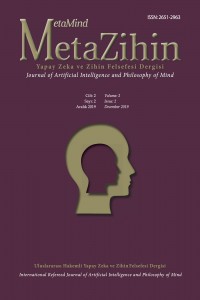Abstract
Bu çalışmada Wittgenstein’ın Tractatus Logico–Philosophicus’ta yaptığı solipsizm eleştirisi ve ‘mantıksal biçim’ kavramı incelenmiştir. Çalışmada ilk olarak dilin kurulum ve kullanımı ile dil-dünya ilişkisinin anlaşılmasında kendisine merkezi önem atfedilen “mantıksal biçim” kavramı ve bu kavramın dilin kurulum ve kullanımındaki merkezi rolü ele alınmıştır. Ardından “mantıksal biçim” kavramının solipsizm eleştirisindeki rolü incelenmiştir. Bu bağlamda ilk olarak Wittgenstein’ın solipsizmin iddialarını, mantığın ve “mantıksal biçimin” kuralları ile örülü argümanlar şeklinde ifade ettiği üzerinde durulmuş, bunun da “kendi kendini yadsıyan argüman” olduğu iddia edilmiştir. İkinci olarak ise Wittgenstein açısından solipsistin haklı olabilmesi için susması ve hiçbir dilsel bildirimde bulunmaması gerektiği hususu incelenmiştir. Wittgenstein açısından dilin kullanımının, dilsel bildirimlerin aktarımı esasına dayalı kullanımı olduğuna ve bunun da ancak belirli zihinler arasında kurulan iletişim kanalıyla olduğu üzerinde durulmuştur. Bu bağlamda son olarak solipsizmin olası herhangi bir dilsel bildirimde bulunmasının çelişki oluşturacağı sonucuna varılmıştır.
Keywords
References
- Arıcı, M. (2019). “Zihin Felsefesi.” M. Arıcı (Der.) ve Y. Adanalı (Yrd. Der.), Felsefe-ye Giriş: Temel Problemlere Sistematik Yaklaşım içinde (s. 106-152). Ankara: Nobel Akademik Yayıncılık.
- Cevizci, A. (2012). Felsefe Tarihi. İstanbul: Say Yayınları.
- Demir, Ö. (2015). Bilim Felsefesi. İstanbul: Sentez Yayınları.
- Fay, B. (2017). Çağdaş Sosyal Bilimler Felsefesi. Çev. İsmail Türkmen. İstanbul: Ayrıntı Yayınları.
- Gödelek, K. (2013). Zihin Felsefesi. İstanbul: Anadolu Üniversitesi Yayını.
- Gözkan, H. B. (2018). Kant’ın Şemsiyesi: Kant’ın Teorik Felsefesi Üzerine Yazılar. Yapı Kredi Yayınları: İstanbul.
- Greisch, J. (1999). Wittgenstein'da Din Felsefesi. Çev. Zeki Özcan. Bursa: Asa Yayınevi.
- Hadot, P. (2015). Wittgenstein ve Dilin Sınırları. Çev. Murat Erşen. İstanbul: Doğu-Batı Yayınları.
- Mandik, P. (2014). This is Philosophy of Mind: An Introduction. Wiley Blackwell.
- Monk, R. (2005). Ludwig Wittgenstein-Dahinin Görevi. Çev. Berna Kılınçer ve Tülin Er. İstanbul: Kabalcı Yayınevi.
- Scruton, R. (2015). Modern Felsefenin Kısa Tarihi. Çev. Utku Özelmas ve Ümit Hüsrev Yolsal. Ankara: Dipnot Yayınları.
- Utku, A. (2014). Wittgenstein: Erken Döneminde Dilin Sınırları ve Felsefe. İstanbul: Doğu-Batı Yayınları.
- Wittgenstein, L. (2016). Tractatus Logico-Philosophicus. Çev. Oruç Aruoba. İstanbul: Metis Yayınları.
- Zambak, A. (2019). “Dil Felsefesi.” M. Arıcı (Der.) ve Y. Adanalı (Yrd. Der.), Felse-feye Giriş: Temel Problemlere Sistematik Yaklaşım içinde (s. 330-360). Ankara: Nobel Akademik Yayıncılık.
Abstract
In this article, Wittgensteins’ criticism of solipsism and the concept “logical form” that he introduces in Tractatus Logico-Philosophicus are analyzed. Firstly, the concept “logical form” to which a central role is attributed in understanding the structure and the use of language, its relation to the world and the central role of the concept in question is examined. Subsequently, the role of the concept “logical form” in the criticism of solipsism is analyzed. In this context, it is first detected that Wittgenstein presents the claims of solipsism as arguments that are built with the rules of logic and “logical form” and it is suggested that these are self-denying arguments. Secondly, Wittgenstein’s claim that the solipsist should be quite and make no verbal assertion in order to be right is examined. Wittgenstein’s claim that the language use is based upon the transmission of verbal reports and that this is only possible through the communication of certain minds is addressed. Within this context, it is concluded that any verbal assertion made by solipsism will lead to a contradiction.
Keywords
References
- Arıcı, M. (2019). “Zihin Felsefesi.” M. Arıcı (Der.) ve Y. Adanalı (Yrd. Der.), Felsefe-ye Giriş: Temel Problemlere Sistematik Yaklaşım içinde (s. 106-152). Ankara: Nobel Akademik Yayıncılık.
- Cevizci, A. (2012). Felsefe Tarihi. İstanbul: Say Yayınları.
- Demir, Ö. (2015). Bilim Felsefesi. İstanbul: Sentez Yayınları.
- Fay, B. (2017). Çağdaş Sosyal Bilimler Felsefesi. Çev. İsmail Türkmen. İstanbul: Ayrıntı Yayınları.
- Gödelek, K. (2013). Zihin Felsefesi. İstanbul: Anadolu Üniversitesi Yayını.
- Gözkan, H. B. (2018). Kant’ın Şemsiyesi: Kant’ın Teorik Felsefesi Üzerine Yazılar. Yapı Kredi Yayınları: İstanbul.
- Greisch, J. (1999). Wittgenstein'da Din Felsefesi. Çev. Zeki Özcan. Bursa: Asa Yayınevi.
- Hadot, P. (2015). Wittgenstein ve Dilin Sınırları. Çev. Murat Erşen. İstanbul: Doğu-Batı Yayınları.
- Mandik, P. (2014). This is Philosophy of Mind: An Introduction. Wiley Blackwell.
- Monk, R. (2005). Ludwig Wittgenstein-Dahinin Görevi. Çev. Berna Kılınçer ve Tülin Er. İstanbul: Kabalcı Yayınevi.
- Scruton, R. (2015). Modern Felsefenin Kısa Tarihi. Çev. Utku Özelmas ve Ümit Hüsrev Yolsal. Ankara: Dipnot Yayınları.
- Utku, A. (2014). Wittgenstein: Erken Döneminde Dilin Sınırları ve Felsefe. İstanbul: Doğu-Batı Yayınları.
- Wittgenstein, L. (2016). Tractatus Logico-Philosophicus. Çev. Oruç Aruoba. İstanbul: Metis Yayınları.
- Zambak, A. (2019). “Dil Felsefesi.” M. Arıcı (Der.) ve Y. Adanalı (Yrd. Der.), Felse-feye Giriş: Temel Problemlere Sistematik Yaklaşım içinde (s. 330-360). Ankara: Nobel Akademik Yayıncılık.
Details
| Primary Language | Turkish |
|---|---|
| Subjects | Philosophy |
| Journal Section | Research/Review Articles |
| Authors | |
| Publication Date | December 30, 2019 |
| Acceptance Date | December 27, 2019 |
| Published in Issue | Year 2019 Volume: 2 Issue: 2 |


